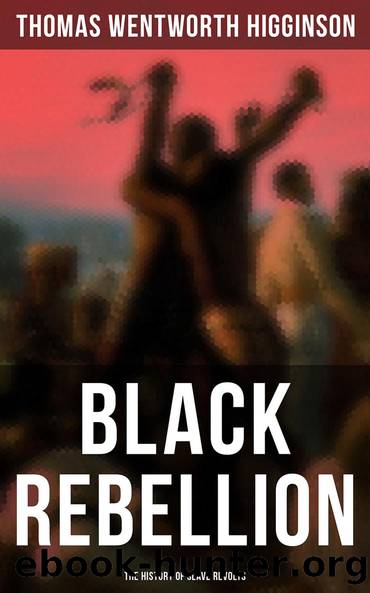Black Rebellion: The History of Slave Revolts by Thomas Wentworth Higginson

Author:Thomas Wentworth Higginson [Higginson, Thomas Wentworth]
Language: eng
Format: epub
Tags: Social Science, Ethnic Studies, American, African American & Black Studies, Slavery
ISBN: 9780981617046
Google: oDe-wAEACAAJ
Publisher: Two Horizons Press
Published: 2010-01-15T04:19:23+00:00
NAT TURNER'S INSURRECTION
Table of Contents
During the year 1831, up to the 23d of August, the Virginia newspapers seem to have been absorbed in the momentous problems which then occupied the minds of intelligent American citizens: What Gen. Jackson should do with the scolds, and what with the disreputables? should South Carolina be allowed to nullify? and would the wives of cabinet ministers call on Mrs. Eaton? It is an unfailing opiate to turn over the drowsy files of the Richmond Enquirer, until the moment when those dry and dusty pages are suddenly kindled into flame by the torch of Nat Turner. Then the terror flared on increasing, until the remotest Southern States were found shuddering at nightly rumors of insurrection; until far-off European coloniesâAntigua, Martinique, Caraccas, Tortolaârecognized by some secret sympathy the same epidemic alarms; until the very boldest words of freedom were reported as uttered in the Virginia House of Delegates with unclosed doors; until an obscure young man named Garrison was indicted at common law in North Carolina, and had a price set upon his head by the Legislature of Georgia.
Near the south-eastern border of Virginia, in Southampton County, there is a neighborhood known as "The Cross Keys." It lies fifteen miles from Jerusalem, the county-town, or "court-house," seventy miles from Norfolk, and about as far from Richmond. It is some ten or fifteen miles from Murfreesborough in North Carolina, and about twenty-five from the Great Dismal Swamp. Up to Sunday, the 21st of August, 1831, there was nothing to distinguish it from any other rural, lethargic, slipshod Virginia neighborhood, with the due allotment of mansion-houses and log huts, tobacco-fields and "old-fields," horses, dogs, negroes, "poor white folks," so called, and other white folks, poor without being called so. One of these last was Joseph Travis, who had recently married the widow of one Putnam Moore, and had unfortunately wedded to himself her negroes also.
In the woods on the plantation of Joseph Travis, upon the Sunday just named, six slaves met at noon for what is called in the Northern States a picnic, and in the Southern a barbecue. The bill of fare was to be simple: one brought a pig, and another some brandy, giving to the meeting an aspect so cheaply convivial that no one would have imagined it to be the final consummation of a conspiracy which had been for six months in preparation. In this plot four of the men had been already initiatedâHenry, Hark or Hercules, Nelson, and Sam. Two others were novices, Will and Jack by name. The party had remained together from twelve to three o'clock, when a seventh man joined themâa short, stout, powerfully built person, of dark mulatto complexion, and strongly marked African features, but with a face full of expression and resolution. This was Nat Turner.
He was at this time nearly thirty-one years old, having been born on the 2d of October, 1800. He had belonged originally to Benjamin Turnerâfrom whom he took his last name, slaves having usually no patronymic;âhad then been transferred to Putnam Moore, and then to his present owner.
Download
This site does not store any files on its server. We only index and link to content provided by other sites. Please contact the content providers to delete copyright contents if any and email us, we'll remove relevant links or contents immediately.
Cecilia; Or, Memoirs of an Heiress — Volume 1 by Fanny Burney(32547)
Cecilia; Or, Memoirs of an Heiress — Volume 2 by Fanny Burney(31946)
Cecilia; Or, Memoirs of an Heiress — Volume 3 by Fanny Burney(31931)
The Great Music City by Andrea Baker(31917)
We're Going to Need More Wine by Gabrielle Union(19034)
All the Missing Girls by Megan Miranda(15958)
Pimp by Iceberg Slim(14488)
Bombshells: Glamour Girls of a Lifetime by Sullivan Steve(14057)
For the Love of Europe by Rick Steves(13913)
Talking to Strangers by Malcolm Gladwell(13349)
Norse Mythology by Gaiman Neil(13348)
Fifty Shades Freed by E L James(13232)
Mindhunter: Inside the FBI's Elite Serial Crime Unit by John E. Douglas & Mark Olshaker(9324)
Crazy Rich Asians by Kevin Kwan(9277)
The Lost Art of Listening by Michael P. Nichols(7494)
Enlightenment Now: The Case for Reason, Science, Humanism, and Progress by Steven Pinker(7306)
The Four Agreements by Don Miguel Ruiz(6744)
Bad Blood by John Carreyrou(6611)
Weapons of Math Destruction by Cathy O'Neil(6265)
